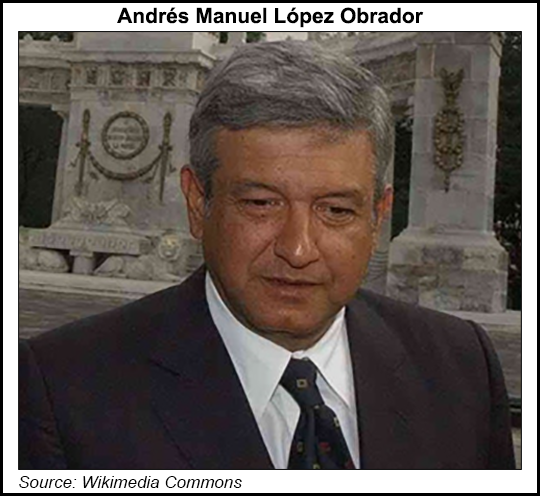E&P | NGI All News Access | Regulatory
Mexico’s President-Elect Will Look to Return Pemex to Prominence
Andres Manuel Lopez Obrador, the overwhelming victor in Mexico’s recent presidential election, believes that his future administration will make the state oil company Petroleos Mexicanos, aka Pemex, “great once again.”

Lopez Obrador speaks with the confidence of a successful politician, of which there is no doubt, following a historic rout on July 1 that lifted him to the presidency. He takes office Dec. 1.
Prominent figures in the business community who questioned his policies, sometimes fiercely, now hail Lopez Obrador, and the markets have given him a vote of confidence.
Yet many observers of the Mexican oil industry have doubts about Lopez Obrador’s “great once again” policy on Pemex and indicate the future president will need his legendary doggedness to overcome the ills of the legacy producer.
The “good old days” of 12 years ago when the Cantarell field pumped more than half of the Mexico’s oil output from the Sound of Campeche are long gone.
“It’s really extraordinary that Mexico’s proven reserves of oil and natural gas have declined for 37 straight years,” said editor/publisher David Shields of Energia a Debate.
Some people in the Lopez Obrador Administration have spoken about the possibility of production ramping up to 3 million b/d.
“But where are the conventional resources going to come from for that level of output? Mexican administrations last for six years,” said Shields. “And Mexican presidents cannot be re-elected. By the end of Lopez Obrador’s term the current reserves will have to be close to exhaustion and have to be replaced.”
Pemex production is currently running at just under 1.9 million b/d of crude and slightly more than 3 MMcf/d of natural gas (not including nitrogen).
Analyst Arturo Carranza of the National Institute of Public Administration believes that the new president’s likely Energy Secretary Rocio Nahle has convinced Lopez Obrador that the crisis in Pemex refining needs to be addressed. The construction of at least one refinery and revamps of the other five are needed to reduce the acute shortage off gasoline and other products, Carranza said.
“The problem there is money,” he said. “It’s not at all clear how the cash could be made available. Might the private sector be interested in pitching in? Let’s see.”
The future administration’s expected Finance Secretary Carlos Urzúa has made clear that his watchword — to the relief of the business community — is fiscal discipline.
And, noted Carranza, “We have to take into account Lopez Obrador’s election pledges to provide state pensions for the elderly and financial support for young people from underprivileged families who want to move into higher education.”
The pensions amount to a modest $330 a month, but about 20 million Mexicans would be eligible to receive them.
The economic challenge is undoubtedly a tough one, “but there’s no need for fatalism where the oil industry is concerned,” said Shields. “The industry can produce a show of force, with intensive programs” of exploration using drilling techniques that built U.S. reserves, like hydraulic fracturing. “But that would require technical and financial capacity that Pemex simply doesn’t have.”
Which is why, he said, it would be “madness” to attempt to set the 2013-14 energy reform into reverse. Pemex in recent years — and possibly for the foreseeable future — has had relatively meager financial and technical resources.
However, Lopez Obrador spent years in the political wilderness. Shields argued that Pemex too, could certainly be great once again.
“I’m not talking about ‘great’ in terms of size,” he said. “By ”greatness,’ Pemex should aim for efficiency and technical competence. It needs a kind of surgical operation that can reshape its way of working and thinking…If it fails to do so, it will continue to slide down what is already a slippery slope.”
© 2024 Natural Gas Intelligence. All rights reserved.
ISSN © 2577-9877 | ISSN © 2158-8023 |
